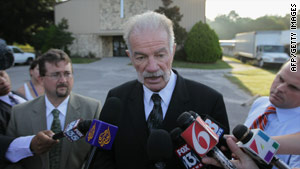by Matthew Carlos Vargas Stehney
“We have nothing against Muslims, they are welcome in our country, they are welcome to worship, we have freedom of religion, we have freedom of speech…they are welcome.”
-Reverend Terry Jones on why he is going to burn the Qur’an.

Recently, a crazy person hijacked the media spotlight and directed it to his small church in Florida, whose congregation was planning to have a Qur’an burning celebration on the ninth anniversary of the terrorist attacks of September 11, 2001. The Reverend Terry Jones and the members of the Dove World Outreach Center in Gainesville, FL felt that burning the most sacred book of the Muslim faith would be a statement against Terrorism. What many have overlooked is that, through the above quote, Reverend Jones not only brings into question the legitimacy of burning the Muslim holy book, but also brings into question American subjectivity and citizenship. Unfortunately for many Muslim Americans, the 9/11 attacks further removed them from the realm of the American subject. Muslim and Arab Americans have been essentialized as inherently outside the boundaries of what is American. However, a question arises from quotes such as this: when does ‘their’ become ‘our?’ If a Muslim becomes an American citizen, or is born an American citizen, or whose grandparents were born American citizens, or is an American citizen who became Muslim; is what they do not then essentially American? Not according to the good reverend, or to a large number of Americans for that matter. They are welcome in our country. This implies that Islam cannot be American, and therefore its adherents are only visitors, or immigrants, but not Americans. Muslim and Arab Americans have had to remind the public that they are also Americans, and were also attacked on 9/11. According to scholars Anny Bakalian and Mehdi Bozorgmehr, following the 9/11 attacks, “Middle Eastern and Muslim American leaders…proactively claimed the rightful place of their constituents in American Society,” and advocated for American Muslims and Arabs from a civil rights platform. This platform is inherently American, operating from within American political and social framework to declare rights as Americans. To these leaders, this is not a conflict between American interests and their own, it is a declaration of rights as American subjects. Bakalian and Bozormehr also cite a post 9/11 study where Americans who displayed the American flag were polled on their reasons for doing so. While various reason for displaying the flag were given, “the authors [of the poll] found a positive correlation between displaying flags and having negative stereotypes of Arabs…some even saying ‘I would like to exclude Arabs from my country,’” despite the fact that many Arabs and Muslims were displaying the same flag at the same time. Is it not their country too? Doesn’t an Arab or Muslim American citizen have just as much a right to say they don’t want someone in their country (the US, if you have yet to catch on)? That is the essential debate prompted by the opening quote of this post. It is impossible to say that Muslims are one way while Americans are another, if you are including Muslims who are also Americans in your statement; it’s a logical fallacy. What Reverend Jones et al fails to realize is that if a Muslim American prays five times a day, then praying five times a day is an American practice; if a Muslim American goes on Hajj, the annual Islamic pilgrimage to Mecca, then going on Hajj is an American practice. Of course, not everyone’s Americanness can be questioned, a white Christian citizen could never be excluded from American subjectivity, regardless of when their family came to this country, or what they did to it. Would Terry Nichols or Timothy McVey ever cause Christianity or whiteness to be cast from what is essentially American? While many would like to believe that whiteness and Christianity are the foundation of American subjectivity, *cough – Tea Party – cough* no American citizen has the right to declare dominion over what is considered American, over the interests of other American citizens. That is the imaginary beauty of the American experiment: equal citizenship under the law. Unfortunately, the American subject has been racialized or essentialized at every point in its history, to the exclusion of others, despite the fact that the rhetoric of American ethics and morals contradicts these exclusionary practices. Will the “melting pot” or “mixed salad” ever actually describe America?
See Also:
Bakalian, Anny and Mehdi Bozorgmehr. Backlash 9/11: Middle Eastern and Muslim Americans Respond. Berkeley: University of California Press, 2009.

No comments:
Post a Comment